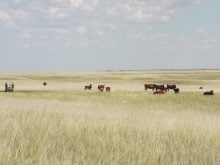DENVER, Colo. — Traceability is more than recalls and animal health.
Traceability has evolved over the last 15 years and was often implemented when serious food poisoning cases emerged, said Brian Sterling, president of CS Consulting, which specializes in Ontario food industry issues.
The science behind the information gathering system should also be considered part of a business plan with continual improvement.
“Those are important issues but if that is all the conversation entails you are missing the opportunity for significant improvement,” he said at the National Institute of Animal Agriculture conference held in Denver, Colorado, from April 10-12.
Read Also

August rain welcome, but offered limited relief
Increased precipitation in August aids farmers prior to harvest in southern prairies of Canada.
“Traceability is a systematic ability to access any or all information pertaining to a particular product or a food under consideration. That is throughout the entire life cycle of that product and it is using recorded identification,” he said.
From a business perspective traceability allows a company to capture more value. It establishes a discipline around treatment of animals and other food products. It also helps reduce business risk in the event of a recall or some other failure.
The produce industry came up with a traceability council when salmonella, listeria and E. coli were found in products like spinach, cantaloupe and jalapeno peppers. The program focuses on traceability throughout the entire chain from grower to point of sale.
Getting cattle producers on board, however, is more of a challenge even when disease issues have emerged. They decry the added work, costs and loss of privacy and confidentiality if they join a traceability system.
“You are in the business of providing food to the marketplace and understand that people are going to want to know where did that food come from, how was it handled, how was it processed and who sold it to me,” he said.















